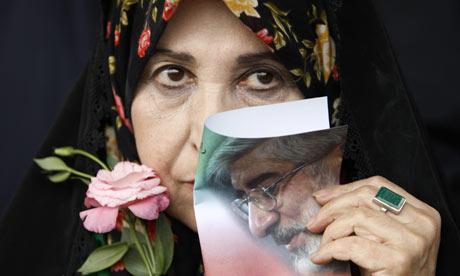The news always gets in late each day, giving the impression that Iran is quiet and the demonstrations are subsiding. It is not so. Items posted at YouTube show there were clashes today and yesterday. (see June 23- Iran protestors fight Basiji June 24 - Protests continue despite suppression)
Iran protesters in 'bloody clashes' with riot police
Witnesses report fresh battles in Tehran as country's supreme leader vows to implement election result

Zahra Rahnavard, Mir Hossein Mousavi's wife, has called for the immediate release of detained opposition politicians. Photograph: Ahmed Jadallah/Reuters
Bloody clashes broke out in Tehran today as Iran's supreme leader said he would not yield to pressure over the disputed election.
The renewed confrontation took place in Baharestan Square, near parliament, where hundreds of protestors faced off against several thousand riot police and other security personnel.
Witnesses likened the scene to a war zone, with helicopters hovering overhead, many arrests and police beating demonstrators.
One woman told CNN that hundreds of unidentified men armed with clubs had emerged from a mosque to confront the protestors. "They beat a woman so savagely that she was drenched in blood and her husband, he fainted. They were beating people like hell. It was a massacre," she said.
With the independent media banned from covering street protests, the reports could not be verified. A witness told Reuters that there had been no violence.
The latest confrontations came as the country's supreme leader, Ayatollah Ali Khamenei, whose authority has been challenged by massive grassroots protests, said on state television: "I had insisted and will insist on implementing the law on the election issue. Neither the establishment nor the nation will yield to pressure at any cost."
But the opposition was just as unyielding. One of the defeated presidential candidates, Mehdi Karroubi, stepped up his challenge to the regime, describing the government as illegitimate. Rejecting the outcome of the 12 June vote, the reformist cleric and most liberal of the presidential candidates said on his website: "I do not accept the result and therefore consider as illegitimate the new government. Because of the irregularities, the vote should be annulled."
In another act of blatant defiance, the wife of defeated opposition candidate Mir Hossein Mousavi called on the authorities to immediately release Iranians who had been detained, .
In remarks posted on her husband's website, Zahra Rahnavard said: "I regret the arrest of many politicians and people and want their immediate release. It is my duty to continue legal protests to preserve Iranian rights."
Rahnavard, who galvanised women voters by campaigning at Mousavi's side before the election, said that the government should not treat his supporters "as if martial law has been imposed in the streets."
Grand Ayatollah Hossein Ali Montazeri, one of Iran's most senior clerics, who has been under house arrest for 10 years, called for three days of national mourning from today for those killed.
"Resisting the people's demand is religiously prohibited," he said on his website. Once the heir apparent to Ayatollah Ruhollah Khomeini, Montazeri fell out with the founder of the Islamic republic shortly before his death in 1989.
Karroubi, who came last in the election, also signalled that opposition would continue, also called on Iranians to hold ceremonies tomorrow to mourn the dead. But Mohsen Rezaei, who came third, has withdrawn his complaints to the guardian council about the 12 June vote, which Mahmoud Ahmadinejad claimed to win by a landslide.
The guardian council has ruled out an annulment of the election, saying there were no major irregularities, although it admitted that more people had voted than were registered in 50 areas. It was announced yesterday that Ahmadinejad would be sworn in by mid-August.
In a sign that the crisis was having a knock-on effect on its foreign policy, the foreign minister, Manouchehr Mottaki, said he had "no plans" to attend a G8 summit meeting on Afghanistan in Italy tomorrow. His decision – which followed Barack Obama saying he was "appalled and outraged" by the violence meted out to protesters in Iran – pointed to rising tensions with the west. Western diplomats had seen the three-day event as a rare chance for the G8 countries and regional powers such as Iran to try to find common ground on Afghanistan and Pakistan.
Iran has accused the US and Britain of stirring up trouble in the post-election violence that has seen at least 17 people killed, although the toll is suspected to be higher. Britain yesterday expelled two Iranian diplomats in a tit-for-tat response to the expulsion of two British diplomats accused by Tehran of being spies.
In a further development, Iran's intelligence minister said some people with British passports were involved in violence, the semi-official Fars news agency reported. Gholamhossein Mohseni-Ejei said one of those arrested in the protests was "disguised as a journalist and he was collecting information needed by the enemies," Fars reported.
Obama yesterday condemned for the first time the violence in Iran. After a week of reticence, the US president went far beyond his previous expressions of sympathy with the demonstrators.
"The United States and the international community have been appalled and outraged by the threats, beatings, and imprisonments of the last few days," he said. "I strongly condemn these unjust actions, and I join with the American people in mourning each and every innocent life that is lost."
Obama spoke of the "searing image" of the dying moments of Neda Soltan, a young female protester shot by a sniper and now an icon of the revolt. He said the demonstrators would ultimately be seen to have been "on the right side of history". The regime's accusations against foreigners, he said, were "an obvious attempt to distract people from what is truly taking place within Iran's borders."




No comments:
Post a Comment